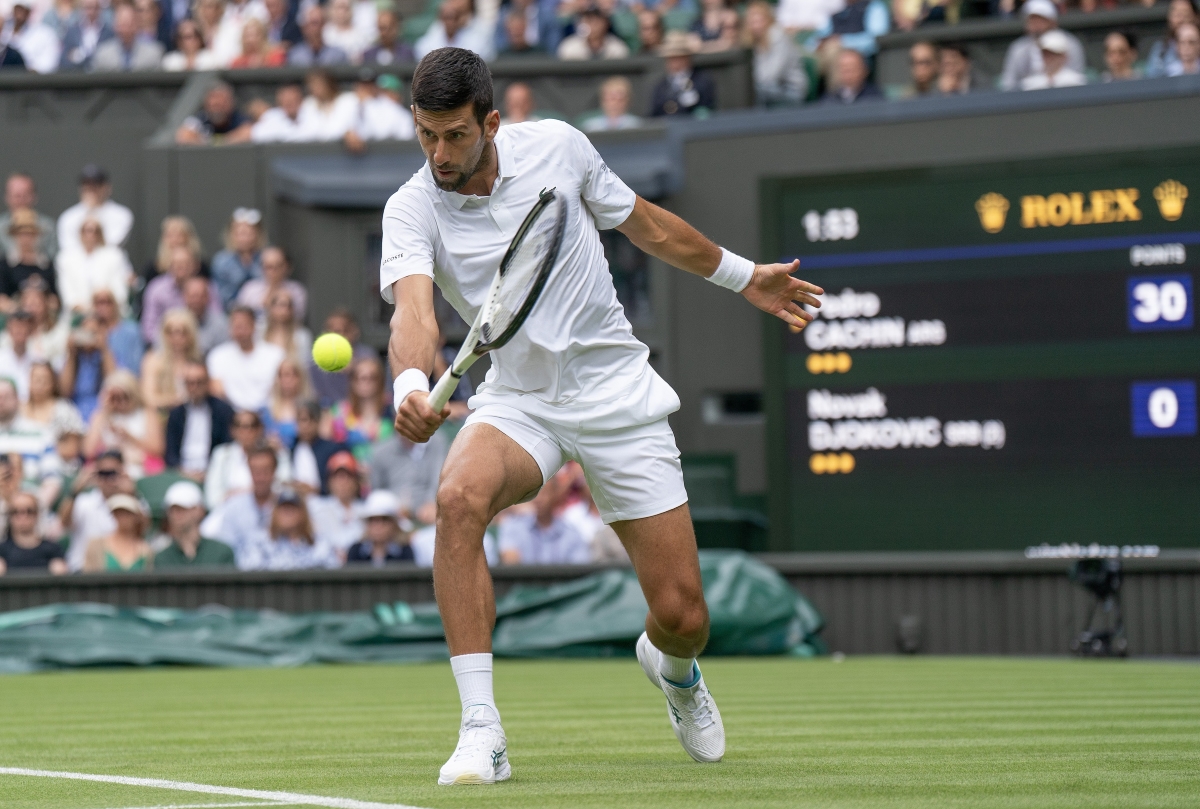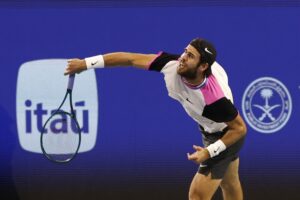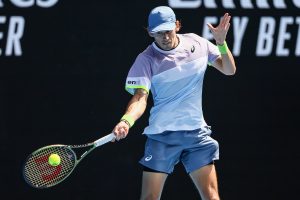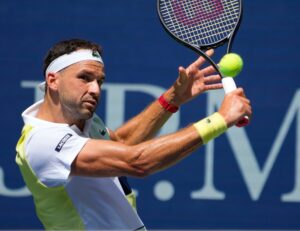It was the knee injury heard around the world, or at least all around the tennis world. Just over a week ago, Novak Djokovic slipped on Philippe Chatrier court at Roland Garros while playing Francisco Cerundolo in the fourth round of the French Open and immediately (and volubly) blamed the court’s surface. It eventually led to his withdrawal from the tournament, throwing into doubt all his ambitions for the rest of the summer. However, Djokovic’s injury may also have had a much longer-term consequence, namely ensuring that Roger Federer will remain the King of Grass – the man with the most Wimbledon titles – for at least the foreseeable future.
Djokovic’s Injury – And Enormous Achievement
In time, the fact that Djokovic went on to beat Cerundolo despite suffering from a torn meniscus might come to be seen as one of his greatest ever achievements on a tennis court, even if it did not ultimately lead to yet another Major title. That is because it proved conclusively just how extraordinarily physically and mentally resilient he is. Most players would not have been able to continue playing after such a serious injury, but Djokovic not only continued to play but ended up winning the match in five sets.
Indeed, it is possible that Djokovic’s injury in Paris will come to be seen in the same light as Rafael Nadal’s withdrawal from Wimbledon in 2022 and Roger Federer’s remarkable run to the Australian Open semifinals in 2020, namely as his last significant contribution at a Major tournament. Two years ago, Nadal suffered a similarly serious injury (only to his abdomen, not his knee) in his Wimbledon quarter-final against Taylor Fritz. He also somehow managed to complete the match, win it and then withdrew from the tournament soon afterwards. Similarly, at the start of 2020 Federer, despite being at approximately only 30% of his best (largely because of the injuries, including knee injuries, that he had suffered at the end of his career), somehow managed to reach the semifinal of the Australian Open.
It is a testament to the incredible qualities of each member of The Big Three that even when they were way below their best at or near the end of their careers, they were still somehow able to summon up performances and achievements that would have been beyond almost any other player at the peak of their career.
But Djokovic’s Short-Term Future Is Still In Doubt
Nevertheless, Djokovic’s knee injury, which is the first significant lower-body injury of his entire career, has thrown his short-term future into doubt. Having undergone an operation in Paris to repair the torn meniscus almost immediately, he will now have to undergo extensive rehabilitation if he is to have any chance of competing at this summer’s other main events.
This summer, of course, is different to most tennis summers in that it not only has an Olympics at the heart of it but what might be called a “Major Olympics”, because the tennis tournament at the Paris Olympics will be played at Roland Garros. That adds an extra layer of appeal to the event, making it even more irresistible to all the top players, both men and women. And it may be most irresistible to Djokovic, because he has never won an Olympic Singles Gold and has publicly stated that winning one is his main aim this year.
It is always difficult adjusting from clay to grass, or from Roland Garros to Wimbledon, which only makes the achievements of those players who have won both tournaments repeatedly, notably Björn Borg in the late 1970s and early 1980s, all the more impressive. Although there is now an extra week between the two summer Slams (making for a total of three weeks, as opposed to the mere fortnight’s turnaround that Borg and others had to deal with), it is still extremely difficult to transition from one surface to the other. That would be true in normal years, but this year, when there is also an Olympic tournament at Roland Garros to consider, it is more difficult than ever.
That is why it is highly likely that Djokovic will end up skipping Wimbledon this year to focus exclusively on the Olympics at Roland Garros. It would be hard enough adjusting from clay to grass, but to do so after a serious knee injury and with the prospect of needing to adjust again to clay for the Olympic tournament is surely too great an obstacle for anyone, even Djokovic, to overcome.
And Men’s Tennis History Could Be Affected Too
However, it is not just Djokovic’s own short-term future in tennis that has been thrown into doubt but the entire history of men’s tennis. That is because Djokovic’s injury and probable withdrawal from Wimbledon this year could ultimately mean that Roger Federer retains the one unique title that he still possesses, namely the King of Grass, as the man who has won the Wimbledon Men’s Singles title the most.
Federer, of course, won eight Wimbledon titles in total, putting him one clear of Djokovic, Pete Sampras and William Renshaw, the King of Victorian Tennis. When Djokovic won his seventh Wimbledon Singles title in 2022, it had seemed almost inevitable that he would end up overtaking Federer on grass just as he had overtaken both Federer and Nadal in the overall number of Majors won (Djokovic is currently on 24, Nadal on 22 and Federer on 20).
Now, however, it seems doubtful, to say the least, that Djokovic will match Federer’s total of eight Wimbledon titles, let alone overtake it. First, he finally lost on Centre Court for the first time in a decade when he lost last year’s all-time great final to Carlos Alcaraz. Now, he is unlikely to play in this year’s tournament. And at the age of 37 and exhibiting, for the first time in his extraordinary career, visible signs of physical deterioration, it is increasingly unlikely that he will ever win Wimbledon again, especially if Carlos Alcaraz defends his Wimbledon crown this year and goes into next year’s tournament looking for a hat-trick of titles.
It Would Be Fitting If Federer Remains The King of Grass (At Least For Now)
For all of Djokovic’s own undoubted greatness, it would be fitting if Federer remained the King of Grass, if only for the time being (or until Alcaraz starts amassing multiple titles). The extraordinary Trivalry (or three-sided rivalry) between Federer, Nadal and Djokovic has not only been undoubtedly the greatest in tennis history but arguably the greatest in the history of any sport. Given the nature of that rivalry, it would somehow have felt inappropriate if Djokovic had pulled too far away from the others at the end of their careers, by winning, say, 25+ Major Singles titles. The arrival of Carlos Alcaraz in particular has probably put paid to that prospect, even if Djokovic still goes on to win a 25th Major Singles title and thus becomes statistically the most successful tennis player of either gender in the history of the sport.
Now, Djokovic’s knee injury in Paris may just have put paid to his ambitions not only of putting a large number of Major titles between himself and his greatest rivals but to any hope he had of catching and then overtaking Federer’s record at Wimbledon. And for all the dismay that may cause Djokovic personally, it might just be a fitting end to the greatest race in tennis history, namely the race between The Big Three to prove just who is the greatest among them.
Statistically at least, it seems certain that Djokovic has now won that race. But he will never overtake Nadal, who won an astonishing 14 French Opens, as the King of Clay and now, because of his injury, he may never overtake Federer as the King of Grass. Instead, he may just have to settle, as it were, for being regarded as “merely” the best all-round tennis player ever (as well as the King of Hard Courts).
If that happens, it would be an appropriate end to the era of The Big Three, with each player retaining at least one unique title to their name. And if Federer, who at his very best was surely the fastest and finest grass-court player ever, remains the King of Grass, then the FedHeds – his global army of fans – will have at least one title with which they can always hail him.
Main photo credit: Susan Mullane-USA TODAY Sports






